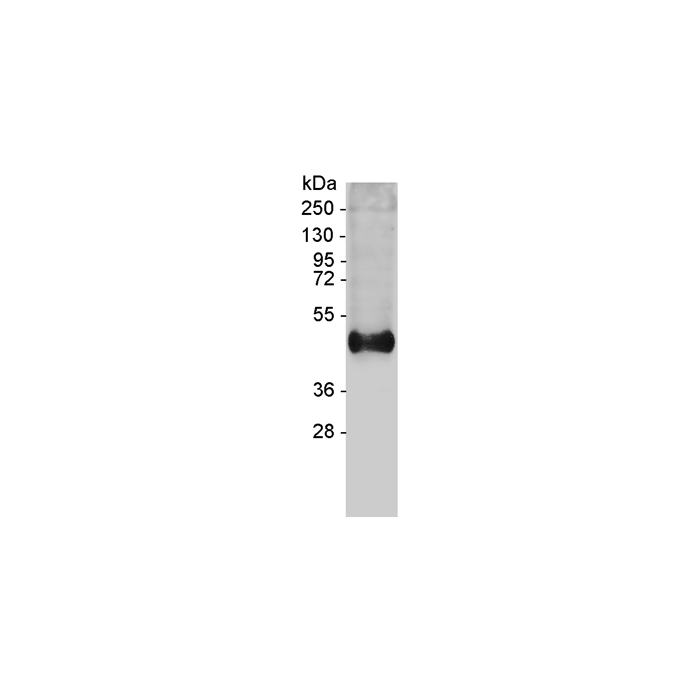Cookie Policy: This site uses cookies to improve your experience. You can find out more about our use of cookies in our Privacy Policy. By continuing to browse this site you agree to our use of cookies.
AdipoGen Life Sciences
anti-Slc7a8 [Lat2], pAb

| Product Details | |
|---|---|
| Synonyms | Solute Carrier Family 7 Member 8; Lat2; L-type Amino Acid Transporter 2; Large Neutral Amino Acids Transporter Small Subunit 2 |
| Product Type | Polyclonal Antibody |
| Properties | |
| Source/Host | Rabbit |
| Immunogen/Antigen | Synthetic peptide corresponding to a partial sequence of mouse Slc7a8 (Q9QXW9). |
| Application |
Western Blot: (1:1'000; 0.5μg/ml) |
| Crossreactivity |
Mouse Rat |
| Specificity |
Recognizes mouse and rat Slc7a8. Detects a ~50kDa Slc7a8 band in wild type mouse brain, kidney, jejunum, ileum and other tissues, which is absent in knock-out animals. In some tissues the antibody detects an additional unknown 38kDa band. |
| Purity | Antigen affinity purified. |
| Concentration | 0.5mg/ml |
| Formulation | Liquid. In PBS containing 1mg/ml BSA and 0.02% sodium azide. |
| Isotype Negative Control | |
| Other Product Data |
UniProt ID Q9QXW9: Slc7a8 (mouse) NOTE: Use in human samples has been published (Wirth, et al.; 2019), but not tested in-house. Due to a relatively low degree of sequence conservation between mouse and human within the sequence stretch used as an antigen, we recommend with human samples that the antibody should be subject to an additional validation, e.g. using cells transfected with human cDNA. |
| Shipping and Handling | |
| Shipping | BLUE ICE |
| Short Term Storage | +4°C |
| Long Term Storage | -20°C |
| Handling Advice | Avoid freeze/thaw cycles. |
| Use/Stability | Stable for at least 1 year after receipt when stored at -20°C. |
| Documents | |
| MSDS |
 Download PDF Download PDF |
| Product Specification Sheet | |
| Datasheet |
 Download PDF Download PDF |
L-type amino acid transporter (LAT) family members are Na(+)-independent transporters, which deliver neutral amino acids into cells. The four LATs, LAT1 (SLC7A5), LAT2 (SLC7A8), LAT3 (SLC43A1) and LAT4 (SLC43A2) are responsible for the majority of cellular leucine uptake. They show increased expression in many cancers and are critical for control of protein translation and cell growth through the mTORC1 pathway. The increased transporter expression observed in cancers is regulated by transcriptional pathways such as hormone receptors, c-myc and nutrient starvation responses.
- Neuronal 3',3,5-triiodothyronine (T3) uptake and behavioral phenotype of mice deficient in Mct8, the neuronal T3 transporter mutated in Allan-Herndon-Dudley syndrome: E.K. Wirth, et al.; J. Neurosci. 29, 9439 (2009)
- Aminoaciduria, but normal thyroid hormone levels and signalling, in mice lacking the amino acid and thyroid hormone transporter Slc7a8: D. Braun, et al.; Biochem. J. 439, 249 (2011)
- Structural insights into thyroid hormone transport mechanisms of the L-type amino acid transporter 2: K.M. Hinz, et al. Mol. Endocrinol. 29, 933 (2015)





